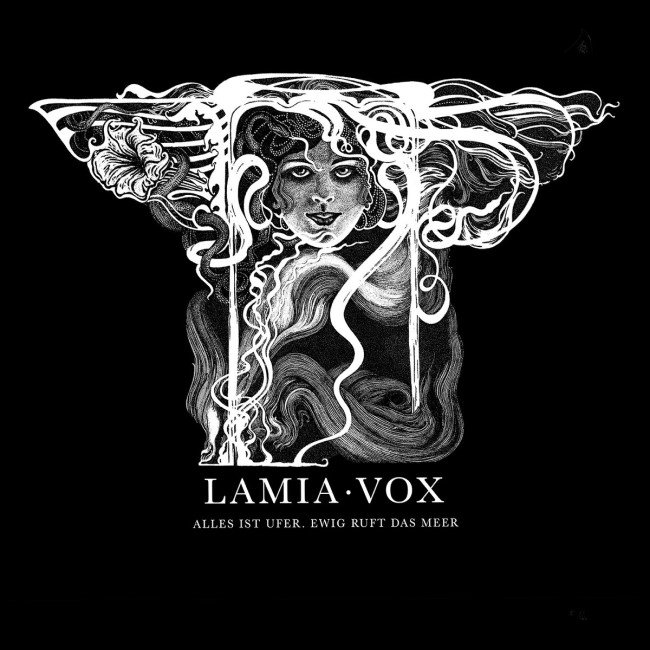
You can support Terra Relicta by donating! Please, do so, and thank you!

Lamia Vox, a stage name for the Russian artist Alina Antonova, who now lives in Prague (Czechia), brings dionysian liberating lawlessness to oppose sterile rationalism and creativity, divine madness, metanoia as a form of ultimate salvation. In August 2020, Lamia Vox released via the mighty French label Cyclic Law her third full-length opus, in English translation: 'Everything is shore. The sea calls forever', or originally, Alles ist Ufer. Ewig ruft das Meer, after the poem by Gottfried Benn. Indeed, poetry flows here. It's a sacred art and process and the laboratory of the Magnum Opus, a divine gift of deliberate madness. Lamia Vox's previous album, Sigillum Diaboli, which got released in 2013, has achieved the status of a cult release, and many consider it one of the best dark ambient/ritual/neo-classical albums of all times. Lamia Vox' is creating a ceremonial atmosphere, and her music is an upward movement, a breakthrough from the bonds of material to the source of life and eternity. Often compared with golden Cold Meat Industry releases, but that is only and solely in terms of dedication and quality of work. Alina revealed many things about her latest album, past works, plans, collaborations, she also revealed some personal things and yet much more. Enjoy reading this interview with this unique artist who creates one of the most haunting ambient soundscapes.
Interview with: Lamia Vox (Alina Antonova)
Conducted and edited by: Tomaz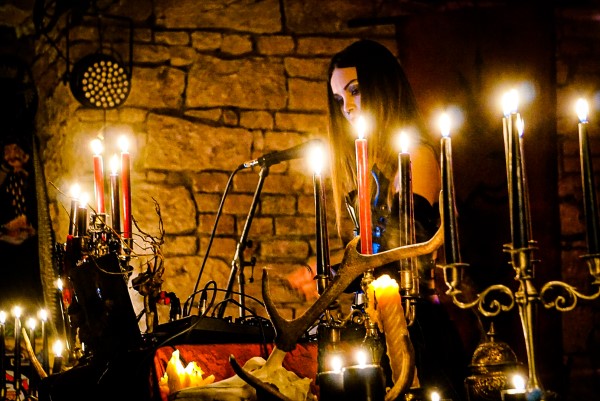 Tomaz: Hi Alina. It's great to see that you've finally released a new album after many years. Since it came out quite some months ago, I wonder how are you satisfied with it now, and what can you say about the general response from media and fans?
Tomaz: Hi Alina. It's great to see that you've finally released a new album after many years. Since it came out quite some months ago, I wonder how are you satisfied with it now, and what can you say about the general response from media and fans?
Alina: Well, I think it came out in the middle of the plague, so people were generically more focused on the simple things and financial surviving; the culture went under the ice in many senses. It was and still is a very uncomfortable and unlucky time for many musicians. However, I have to say that I am really satisfied with the album itself and with the people's response to it. After it came out, many long time fans contacted me and extended their good attitude and support, which made me grateful, closer to them than ever before, and really proud and glad for the outcome of my continuous work.
Tomaz: What was the reason it took you seven years to make and release a new album? Was there not enough inspiration, or is the reason somewhere else?
Alina: Haha, I have never pushed myself towards things that have the right to take their time. I would better re-do the thing 100 times than one-time release it without being sure I could not do anything better or more there. Also, it coincided with many changes in my personal life, so I had much less time to work on music than ever.
Tomaz: Your previous masterpiece, Sigillum Diaboli, is considered by many as one of the best ritualistic/dark ambient albums ever. I presume that it must have been difficult for you to create another masterpiece with similar proportions? The new offering sounds different in many ways; the first thing that the listener can notice is that it's more fluid, and I'm interested in how you see the differences?
Alina: Never tried to compare. It’s a whole new world, this album, and it is the outcome of my thoughts and feelings throughout all these last years. Many things changed, also my attitude towards things. I started to look through and see the other meaning behind things I blindly believed in. And I saw a lot of the meaning and hidden wisdom (not the knowledge, but knowing) in the poetry.
Tomaz: The album is titled after Gottfried Benn's poem, and what was the reason for this title. How does it connect with music and lyrics? What more can you tell me about the lyrics and is there some kind of a message? What everything inspires you in this regard?
Alina: For me, this poet's works are manifests of the true spirituality which was still around in the late 19th and in the beginning of the 20th century. As for the lyrics, I picked up a certain number of the most meaningful pieces of the poetry of that era and each of them has a very strong message (for those still alive to receive it). It is also a farewell, in a way, I’ve served a funeral to the world as we knew it, and we are soon the last ones of our kind.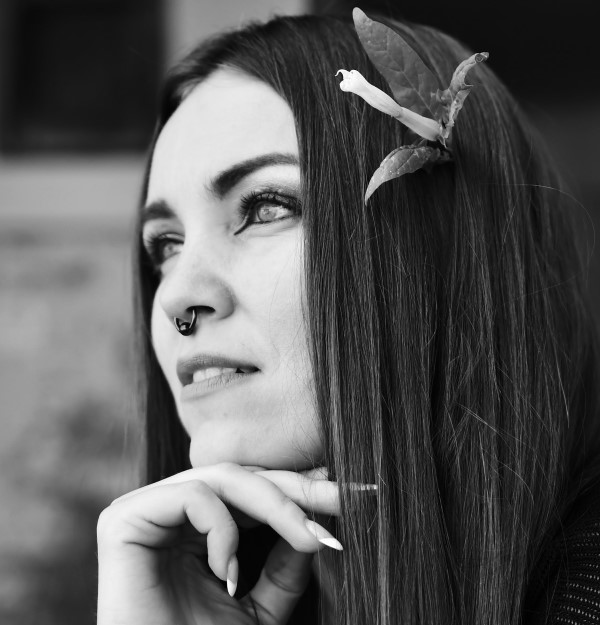 Tomaz: The album got released via Cyclic Law, just like your previous album, which also got re-released. Does this mean that you are completely satisfied with the label's work?
Tomaz: The album got released via Cyclic Law, just like your previous album, which also got re-released. Does this mean that you are completely satisfied with the label's work?
Alina: The label did a great job on that release. Also with the design of the layout, which was a perfect match with what I had in my mind. Frederic and I have a similar taste about everything related to the visual part of things, be it for the album covers, the label releases or fashion. All of this played a big role in the final shape of the album that was perfect for me.
Tomaz: Lamia Vox is often considered as a dark ambient act but to be honest, there's just a little of typical dark ambient there. How do you describe your music?
Alina: Yes, that is quite a secret to me why I am still (stubbornly) considered as a dark ambient artist. Honestly, only the raw first album was somehow close to this genre, and maybe that’s why this is still stuck to the description of my music. The later albums are very far from being dark ambient, obviously. It's neo-classical or martial at some parts. However, it's hard to find the right stylistic description for it as it is very eclectic. The newest album is as far from being dark ambient as possible. The next creation will be different again. I can promise that. Maybe it is not the best way how to create consistent musical material, but it is just me, and I hate boundaries.
Tomaz: I believe that many fans of your music want to know about the compositional process of your songs. What comes first, what last, and where the ideas are born?
Alina: As surprising as it might sound, the first moment I put my hands on the keyboard, I already play the whole melodic background, and subconsciously feel the needed arrangements. It exists in my head from the very beginning. I just need to find the fitting sounds and lines to my "mind draft". As for the technical part, I use a lot of original instruments, sample them, re-shape them, and use them in the mix with the vintage synths I have in my "park". However, this music is very multi-layered and that actually makes it much harder to perform live.
Tomaz: I was always curious what your artistic name Lamia Vox means, and how did you come up with it?
Alina: It came in the dream. Lamia Vox was my name in some kind of the parallel reality where I was acting on behalf of the hungry Night, thirsty for the blood of the mortals, haha. Honestly, Lamia is a female demon’s name, and Vox means “voice” or “choir” in Latin. Hearing the singing of this creature will promise nothing good, and it evokes the blood-thirsty dark realm of ancient freedom. That is my motherland.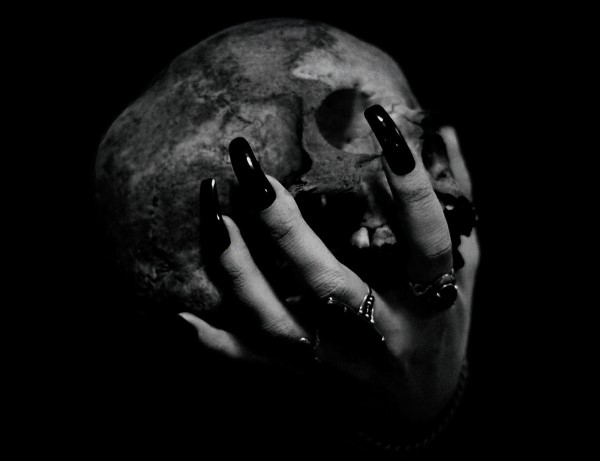 Tomaz: More than anything, the Dead Can Dance influence is heard in many of the new songs. Are you a big fan of them, and who else can you name as your influence?
Tomaz: More than anything, the Dead Can Dance influence is heard in many of the new songs. Are you a big fan of them, and who else can you name as your influence?
Alina: Well, I guess it is hard not to sound like Dead Can Dance if you use the same instruments. I never could call anything my influence, it happens so automatically, and I don’t even think about it. I'm sure that everything you are listening to affects you, in a way how you understand and hear the music in your head.
Tomaz: Before releasing the new album, you also contributed vocals to the stunning track "Man Of Fire" by Vortex. How was working with him? Since I don't know this information, did Vortex perform with male vocals in your song "The Return"? It sounds familiar.
Alina: No. The male voice on “The Return” is by Eskil Blix, the singer and mastermind in black metal bands such as Mare, Black Majesty and Vemod. This track, however, is a collaboration between me and his neo-folk project Solstorm. Eskil creates amazing and sincere music. Marcus of Vortex is my old friend, he asked me to create a new version of this track, the cover of “Man Of Fire”, which is one of my most favourite musical pieces, so of course, I gladly said yes.
Tomaz: You are also active as a live act. Now, due to the pandemic, every musician suffers a bit because of the situation. How do you deal with it, and how much did the Covid-19 pandemic affected you?
Alina: Yes, few gigs of mine were postponed or cancelled due to the plague. I feel sorry for the visitors, who were looking forward to it, and also to the organisers of those events, as I understand how much effort and money they have to invest in every single one to make it happen. At the same time, as an artist, I am not that much affected by it. I am introverted, misanthrope, and I hate playing live, except for the feeling of being united with the listeners, that is amazing, but all the technical part is always very stressful for me, and I would rather run away and hide than doing it. That might be funny, but here is a mix of the will to perform in public, deliver a message, and of the humble person I am.
Tomaz: Regarding all this, what can the one expect to get on your live show?
Alina: Goosebumps. Feeling vulnerable. I hope.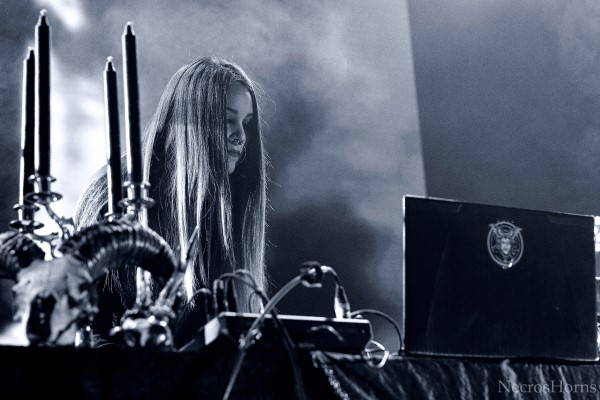 Tomaz: Some years ago you moved from Russia to Czechia. Is this a better environment for you to work on your music, or was the reason somewhere else?
Tomaz: Some years ago you moved from Russia to Czechia. Is this a better environment for you to work on your music, or was the reason somewhere else?
Alina: That sounds like a perfect world, you know, moving countries only because it would be a better place for making music, haha. In the real world, it slowed down my musical performance from the beginning, but now, at least I have no blockers of the bureaucratic origin, so I would be able to create more freely. The reason for my move was somewhere in a political realm. I just could not cope anymore with the realities in my native country back then.
Tomaz: If this is not too personal, can you tell me, who's Alina outside the music world? What are the things besides music that enthuse you?
Alina: Wild nature is my first and foremost inspiration, and I can hear what groves and rivers are whispering to my ears: I create from what they say. I feel the spirits behind it, and I can communicate with them. I have a strong bond with plants and forests, and that is where I feel alive. I see how everything is bounded together and how it is a part of the never-ending cycle of life. I can see how everything is returning, and so will I. At the same time, this knowing and this feeling of wholeness give me the ability to survive in the cities. I can easily live surrounded by technics, they are alive too in a way, but rarely I can stand the emptiness of the human community with its artificial values and the constant need to be smashed or amazed. I think I am a weird one who can have a better talk with the wolves and trees than the humans. Quite an honest one, uh? Yeah, and never talk about anything Christian to me, please. I see Christianity as the most influential force of our current community being so sense-less and d/numb.
Tomaz: Besides Lamia Vox, are you active in any other music project or band?
Alina: I will. I have a couple of side projects in drafts that will be presented to the public when the time is right. Nothing even close to what I do as Lamia Vox. Be it more tech or folkish, you guess.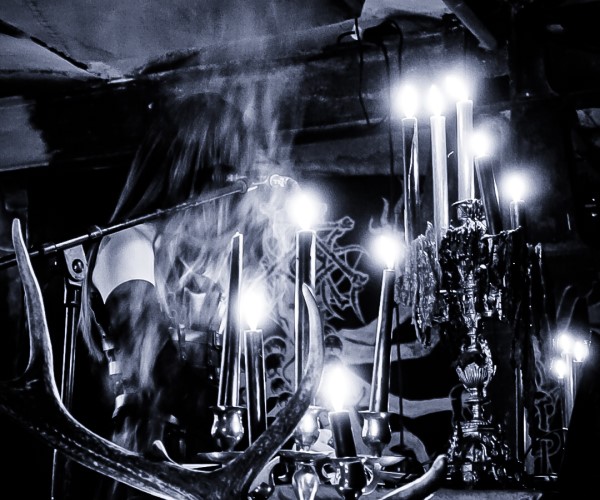 Tomaz: I hope that we will not have to wait for another seven years for your next album. Are you already working on something new?
Tomaz: I hope that we will not have to wait for another seven years for your next album. Are you already working on something new?
Alina: Yes, as I already explained in the previous answer. And new Lamia Vox is coming up too, even if I thought that this one is the last.
Tomaz: Thank you Alina for all the answers. Is there anything that you'll like to add at the end of this interview?
Alina: Yes. I hope more people will be coming to the gigs, listen to my music and ask me the right questions.
Lamia Vox links: Facebook, Instagram, Bandcamp
Lamia Vox discography:
- ...Introductio (2010)
- Sigillum Diaboli (2013)
- All Hope Abandon [EP] (2018)
- Inlumaeh [EP] (2019)
- Alles ist Ufer. Ewig ruft das Meer (2020)
Photo credits (except for the portrait): @NecrosHorns